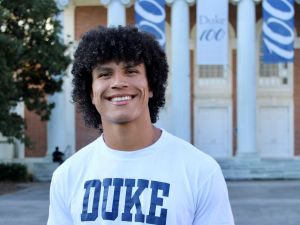Discovering the Playwright Within: Isa Mellody Asks Do I Know You?
“As a playwright, you have the freedom to tell the audience what kind of world they are experiencing,” said Isa Mellody, “but the rules have to be well thought out and specific.”
Mellody, who is graduating with a major in Theater Studies, spent her senior year developing rules for the world she built for her distinction project, Do I Know You?, an original play written under the direction of Professor Neal Bell.
"Do I Know You? is about a college student, Kat, who's in the often painful, often exhilarating process of discovering who she is,” said Bell. Mellody staged two readings of the play. “The first was a cold reading in a classroom — very well cast, so Isa [Mellody] learned a lot about the play and incorporated what she'd learned into the final draft,” said Bell. “That draft received a rehearsed reading in Sheafer Theater; there was a sizeable audience who were delighted by it, and Isa got a very good sense of how Do I Know You? would work on its feet.”
We wanted to learn more about Mellody’s process for creating Do I Know You? and what comes next for her after graduation.
This interview has been lightly edited for length.
Why did you decide to write a play for your distinction project?
When I was a sophomore, I took THEATRST 280S: Dramatic Writing with Professor Bell. This was my first introduction to playwriting, and although it was difficult, it was so much fun to hear my own work spoken into the world. I have also participated in Playhouse Shorts with my student theater group, Duke Players, which is a new works lab where writers can see their plays staged. These experiences and my love of writing led me to commit to a year-long distinction project. I’ve wanted to write since I was old enough to read, but always struggled with finishing projects because I would get bored and discard them. I knew that with the academic pressure, I would have additional motivation to finish the play.
How did Do I Know You? develop from your initial idea to the staged readings?
Do I Know You? changed so much from the first draft to the reading script. I went in with an outline, which I generally followed, but I learned a lot about the story and what I wanted to include just by writing and continuing to revise with notes from Professor Bell, and my mentor at Duke Arts Studio, Marshall Botvinick (T’06). One notable difference between the first draft and the final is the relationship between Kat, our protagonist, and Ace, her best friend. Originally, the relationship was one of confidantes, but throughout the process, they turned from amicable buddies to friends who both have a competitive streak and a slight rivalry. Giving their relationship this edge made the play much more interesting and added to the conflict throughout.
What were some of the most significant things you learned during this process?
I learned a lot about the conventions of playwriting, how to format my dialogue, as well as the importance of establishing a contract with the reader or audience right away. In Do I Know You?, we moved between scenes that took place in the “real world” and scenes that took place in the characters' imaginations, so I had to come up with creative theatrical ways to differentiate between the two.
In terms of process in general, I learned that the best way to get better at writing is to do it constantly. Professor Bell told me early on that no writing is wasted, whether it's another scene, a poem, a reflection for class or even a personal journal entry. I feel more comfortable writing, even if it's not perfect or I'm not in the "right headspace" to do so. The only way I've gotten through periods of writers' block is to write something, regardless of whether it's related to the play.
What was a surprising/unexpected thing that happened along the way?
I was surprised at all the different interpretations that people had of Do I Know You?. Until January, Neal and Marshall were the only people who had read it, but when I started to share the play with actors, a director, and then finally, an audience, people had many differing views of each character, their motivations and especially about the nature of their relationships with each other. During rehearsals, the director, Tess Redman, and the actors who participated in the reading, pointed out details and subtext to me in the script that I hadn't even considered when I was writing. Their additional viewpoints further complicated each character and showed me that everyone had taken away something different.
What are your plans after graduation?
After graduation, I'm moving back to New York City, which is where I grew up. I'm taking acting classes at the Michael Howard Studios this summer, and after that I will be auditioning and continuing to write. I will continue to work on Do I Know You? I hope to stage another reading and revise until I can't anymore. Then, on to the next one!




